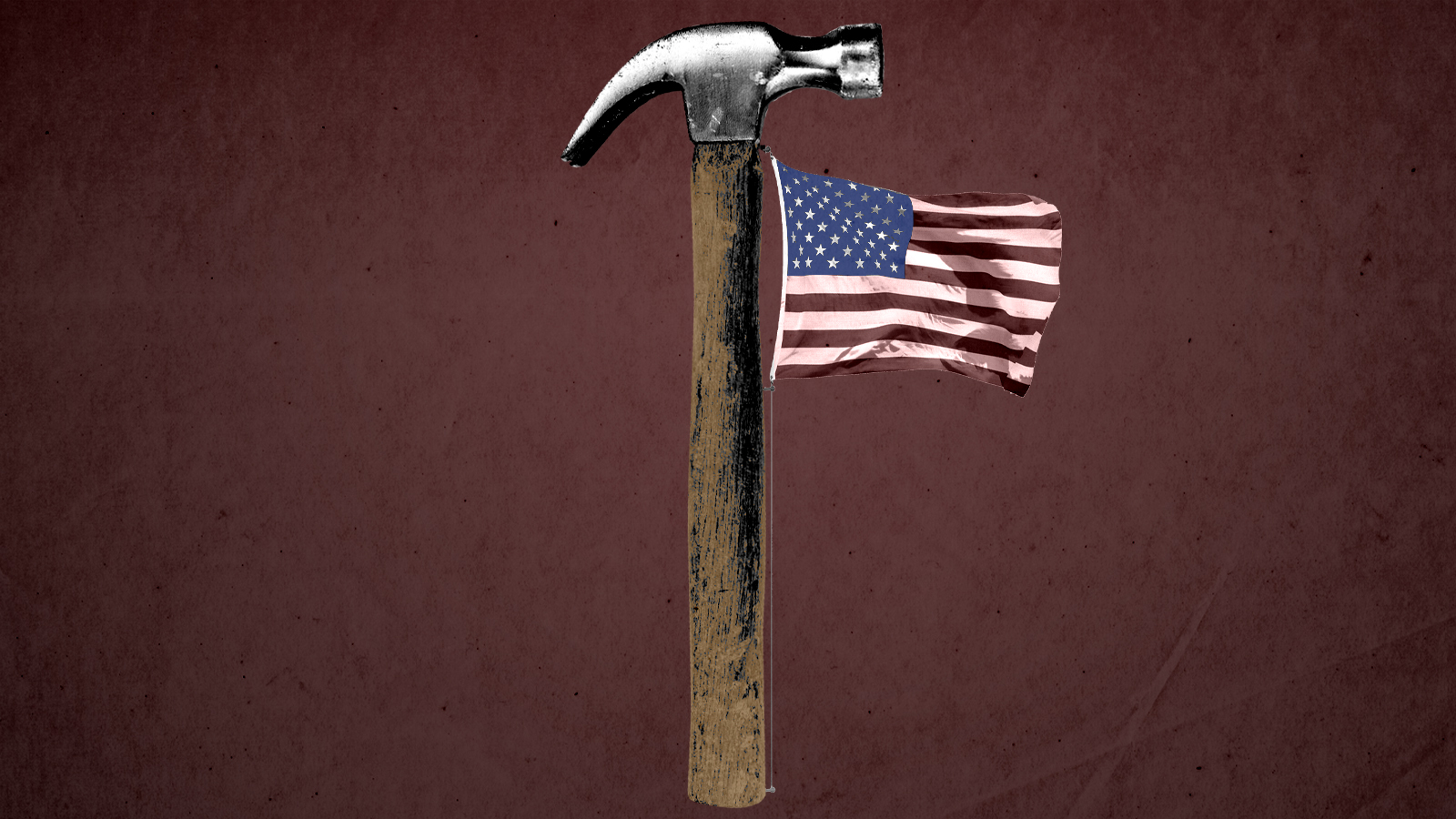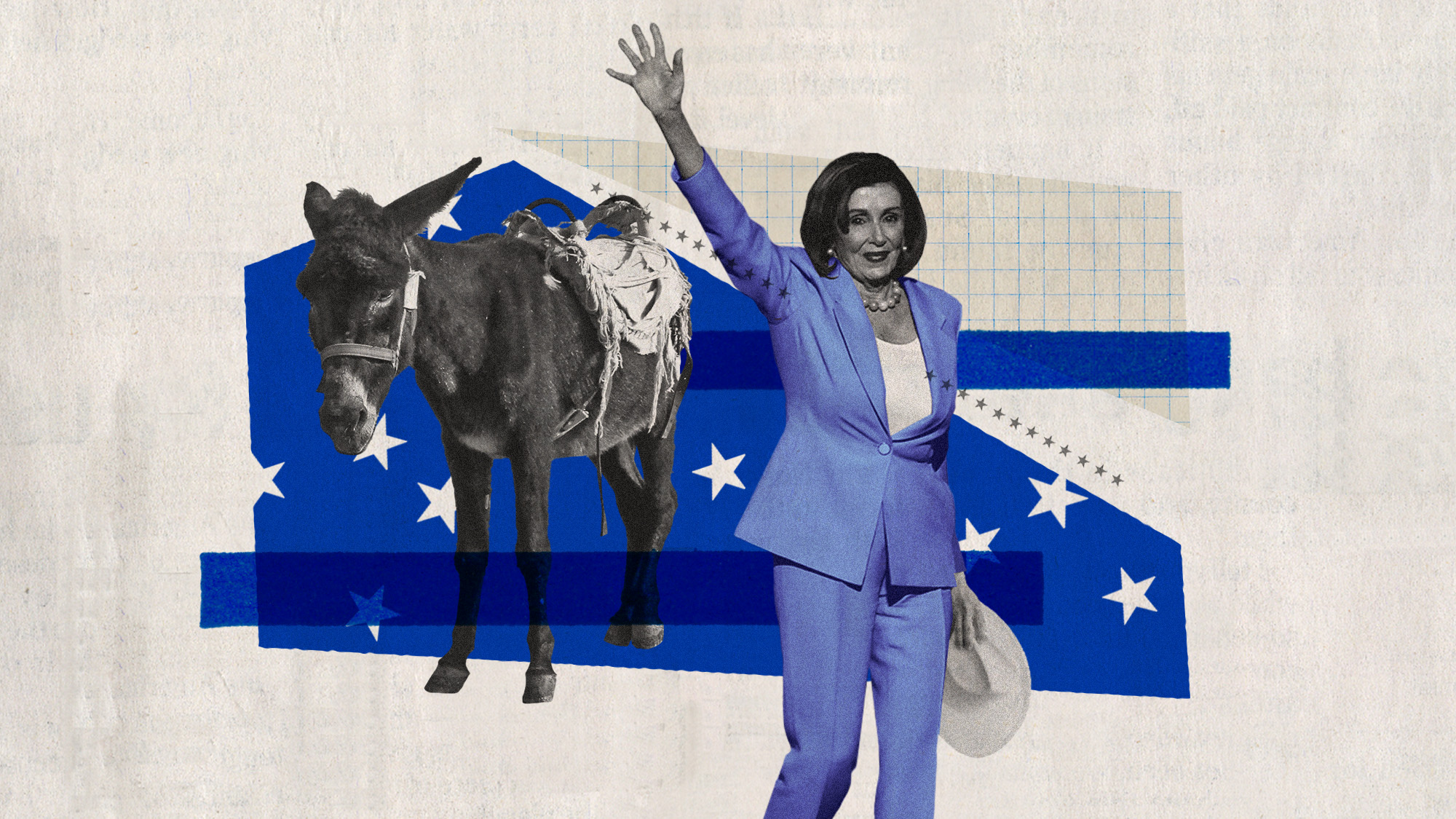The link between partisan rhetoric and violence
The sharpest opinions on the debate from around the web


A free daily email with the biggest news stories of the day – and the best features from TheWeek.com
You are now subscribed
Your newsletter sign-up was successful
The recent attack on House Speaker Nancy Pelosi's husband has injected fresh urgency into the quintessential modern debate: What and where is the link between American politics, partisan rhetoric, and violence? Here's how experts are making sense of the question after the most recent incident:
The Pelosi attack illustrates the partisan problem of political violence
At its core, the aggression is "inextricable from a broader concern about political violence in the United States," argued Philip Bump for The Washington Post. According to news outlet reviews and anecdotal evidence, the suspect in the attack, 42-year-old David DePape, was engaged in online political conspiracies and hateful rhetoric prior to the break-in; one acquaintance characterized him as "out of touch with reality." DePape also indicated he was actually after the speaker, a common and longtime target of political hostility, and wanted to break her kneecaps to show "other members of Congress there were consequences to actions," according to a Monday affidavit. "If DePape is shown to have been suffering from mental illness that contributed to his actions, it's clear that political rhetoric about Pelosi was a key factor in bringing him to the house," Bump continued.
But unfortunately, that's not where discussion of the incident has led — rather, the narrative has become shrouded in dubious theories and baseless allegations (Bump points to Republicans here, in particular), all of which obscure the real, and very frightening, takeaway: That "an 82-year-old man was beaten with a hammer simply because his wife is a prominent Democrat." The conspiracies that have taken hold, largely in right-wing circles, defy "credulity from the standpoint that DePape spent weeks sharing right-wing and conspiratorial content on the web, something that fits far more neatly into the real story than the contrived one." As the violence has clearly illustrated, "there's an ecosystem interested in scoring points against the left regardless of how morally repulsive doing so might be."
The Week
Escape your echo chamber. Get the facts behind the news, plus analysis from multiple perspectives.

Sign up for The Week's Free Newsletters
From our morning news briefing to a weekly Good News Newsletter, get the best of The Week delivered directly to your inbox.
From our morning news briefing to a weekly Good News Newsletter, get the best of The Week delivered directly to your inbox.
This is a concern for all sides
In more ways than one, DePape "fits the profile" of what we might expect from the alleged perpetrator of such a crime — someone who "latches on to internet obsessions, some of which turn out to be political," mused The Wall Street Journal editorial board. But the "U.S. is full of such people, and their political targets are on the left and right, Democrats and Republicans." In other words, the omnipresent issue of political violence does not pertain solely to one side or one politician. Remember when an armed man, upset about the leaked draft opinion overturning Roe v. Wade, was arrested near Justice Brett Kavanaugh's home back in May? Or when, during a campaign stop, New York gubernatorial candidate Rep. Lee Zeldin (R) was forced to dodge a man who rushed on stage wielding a sharp object?
"Ultimately, the political and media classes can help by avoiding hateful rhetoric aimed at their opponents," suggested the Journal. "The risk of violence will grow as the election nears and passions get hot, and as more people come to mistakenly believe that any one election will determine the country's fate. Small-d democratic tolerance is in short supply these days, but it behooves everyone in public life to practice it."
Los Angeles Times columnist Mark Barabak agreed with the Journal: "The animosity — if not outrageous caricature — runs both ways. Repeated polls have found Democrats questioning the goodwill and patriotism, not to mention judgment, of Republicans," Barabak said. "It's no longer just the fringe acting out."
Any political violence is a problem — but there are numbers at play
The attack on Paul Pelosi should "shock the conscience of the nation," Jill Filipovic argued in The Guardian. But instead, many conservatives have been "working overtime to deny that the right holds any responsibility here, chalking this up to a random act of violence and arguing that sometimes leftists are violent, too." Of course, that's undoubtedly true, Filipovic said, citing the same instances as the Journal's editorial board. But there are some important differences between right and left-wing political violence, "not least among them the fact that right-wing political violence is much more common … [and] much more likely to be fatal than left-wing violence." Any and all political violence is, of course, a problem — but when you look at the numbers, one type is more pervasive and significant than the other.
A free daily email with the biggest news stories of the day – and the best features from TheWeek.com
For instance, when Rep. Steve Scalise (R-La.) was shot and nearly killed in 2017, there were no "prominent liberals with national platforms and connections to Democratic administrations" that suggested dressing as an injured Scalise for Halloween, à la Donald Trump Jr. after the Pelosi incident. There is "a pattern here that you just don't see on the left," Filipovic continued, and right-wingers and the Republican Party must stop treating the attack on the speaker's family "like a sideshow instead of the real warning it is."
Blaming only Republicans is wrong and transparent
The focus on Republicans in the aftermath of the attack makes it clear the media's discussion of the incident has less to do with "toning down political rhetoric" and more to do with "demonizing their political opposition," Zachary Faria mused for The Washington Examiner, citing an interview in which CBS News' Margaret Brennan suggested National Republican Congressional Committee Chair Rep. Tom Emmer (R-Minn.) pull some of the Republican attack ads mentioning Pelosi by name, or even delete a tweet in which he wrote "#FirePelosi" while holding a gun. (Emmer did condemn the attack on the speaker's husband, but defended the original message of his tweet, which he said was not an ad and more about just "exercising our Second Amendment rights" and "having fun.")
In indicting conservatives for criticizing Pelosi, the media reveals itself only interested in political violence because it can place the blame on Republicans — ahead of the midterms, at that. "That is what establishment media decided to do here before we even knew anything about the culprit," Faria said. "This is nothing more than a transparent attempt to get Republicans to stop campaigning or, more likely, to demonize Republicans further for daring to campaign after the attack."
While she didn't find claims of Republican culpability entirely tied to election ambitions, columnist Ingrid Jacques also took issue with the media's framing. Writing for USA Today, Jacques condemned the immediate politicization of the attack — "it strikes me as offensive and sad that we can't take a moment to simply feel compassion for a fellow human being" — and argued the immediate GOP finger-pointing is "a lot to assume" given what we still do and don't know about the DePape. "The incivility and tribalism that surround us comes from both sides," she continued. Further, Jacques said she does not recall "any national reckoning about devise debates" or incisive statements from President Biden following the Kavanaugh incident, nor was there similar "media handwringing" after the assault on Scalise. The truth here, Jacques concluded, "is likely to be trumped by political opportunism."
Brigid Kennedy worked at The Week from 2021 to 2023 as a staff writer, junior editor and then story editor, with an interest in U.S. politics, the economy and the music industry.
-
 Health insurance: Premiums soar as ACA subsidies end
Health insurance: Premiums soar as ACA subsidies endFeature 1.4 million people have dropped coverage
-
 Anthropic: AI triggers the ‘SaaSpocalypse’
Anthropic: AI triggers the ‘SaaSpocalypse’Feature A grim reaper for software services?
-
 NIH director Bhattacharya tapped as acting CDC head
NIH director Bhattacharya tapped as acting CDC headSpeed Read Jay Bhattacharya, a critic of the CDC’s Covid-19 response, will now lead the Centers for Disease Control and Prevention
-
 The billionaires’ wealth tax: a catastrophe for California?
The billionaires’ wealth tax: a catastrophe for California?Talking Point Peter Thiel and Larry Page preparing to change state residency
-
 Bari Weiss’ ‘60 Minutes’ scandal is about more than one report
Bari Weiss’ ‘60 Minutes’ scandal is about more than one reportIN THE SPOTLIGHT By blocking an approved segment on a controversial prison holding US deportees in El Salvador, the editor-in-chief of CBS News has become the main story
-
 What happens to a Democratic Party without Nancy Pelosi?
What happens to a Democratic Party without Nancy Pelosi?TODAY'S BIG QUESTION The storied former speaker of the House is set to retire, leaving congressional Democrats a complicated legacy and an uncertain future
-
 Has Zohran Mamdani shown the Democrats how to win again?
Has Zohran Mamdani shown the Democrats how to win again?Today’s Big Question New York City mayoral election touted as victory for left-wing populists but moderate centrist wins elsewhere present more complex path for Democratic Party
-
 Millions turn out for anti-Trump ‘No Kings’ rallies
Millions turn out for anti-Trump ‘No Kings’ ralliesSpeed Read An estimated 7 million people participated, 2 million more than at the first ‘No Kings’ protest in June
-
 Ghislaine Maxwell: angling for a Trump pardon
Ghislaine Maxwell: angling for a Trump pardonTalking Point Convicted sex trafficker's testimony could shed new light on president's links to Jeffrey Epstein
-
 The last words and final moments of 40 presidents
The last words and final moments of 40 presidentsThe Explainer Some are eloquent quotes worthy of the holders of the highest office in the nation, and others... aren't
-
 The JFK files: the truth at last?
The JFK files: the truth at last?In The Spotlight More than 64,000 previously classified documents relating the 1963 assassination of John F. Kennedy have been released by the Trump administration
